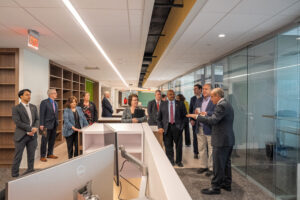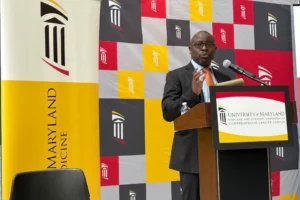Why UMB and Hopkins came together to grow entrepreneurship in Maryland
University of Maryland, Baltimore and Johns Hopkins University could safely be classified as “friendly competitors.” Operating in the same city, the two institutions “compete” for the funding and recognition as major research forces in the state. Both are affiliated with large medical systems, anchored by two of the highest-earning hospitals in the state.
But it seems they have found common ground in at least one mission: trying to grow state’s tech ecosystem and better support the startup community.
UMB and Hopkins recently collaborated on two different incubator projects as part of a funding competition presented by the Maryland Technology Development Corp. Both projects will now be brought to life, using the $125,000 they each won in the challenge.
Linda Cassard, assistant vice president in UMB’s office of research and development, said it all began when the TEDCO incubation challenge came up and called for collaborative tech projects across the state. The tech-minded folks at UMB and Hopkins saw an opportunity to step beyond their own walls and create something bigger in Baltimore.
“We started thinking about what we could do together, what we could do for Baltimore, instead of going at the same game with different bats,” Cassard said. “We’re bringing the force and power of our anchor institutions together to create a bigger impact.”
Megan Wahler, program manager for Hopkins’s FastForward incubators, said the concept for both projects started by looking at where the holes are in Maryland’s entrepreneurial ecosystem and talking to startups about what they needed.
Here are the two projects they came up with:
- Anchor Ventures, a project that builds on a “venture cafe” model that has worked in other states. It will include meetings on the third Thursday of every month where startups and entrepreneurs can network, collaborate, engage with guest speakers and mentors and mingle with venture capitalists in a relaxed environment. The program will be piloted in Baltimore, with hopes to expand it to other parts of the state as well.
- TrajectoryNext, a new post-accelerator program that will offer startups support and assistance as they work to build up their teams and acquire new customers. It is designed to serve startups that are navigating the tricky period after graduating from an accelerator or incubator and losing that outside support system. The collaborative team included local incubator Betamore as well as representatives from Hopkins and UMB.
The teams are working now to plan out the details of each project, so they can both launch in January 2018.
Wahler said one of the things the team leaders found looking around the country is that bringing a lot of people together is a great way to aggregate and develop talent
“There is a lot more in Baltimore and in the region than what you’re seeing day to day,” Wahler said. “We want to be able to showcase the depth and breadth of what’s going on.”
The fragmentation of Maryland’s tech community is a common complaint. That is part of what these incubation projects are trying to fix. Cassard said they want both concepts to be accessible to the whole tech community of Baltimore, regardless of focus area or affiliation.
Tech will continue to be a unifying factor for these friendly competitors. Hopkins and UMB are also collaborating on a new accelerator called M1 Ventures, which is aimed at growing startups focused on health and fitness technology. Cassard there will be more collaborative initiatives to come in this space, and they are always open to bringing in other partners as the projects progress as well.
“It’s all about growing our local innovation economy. We both want that,” Cassard said. “We want there to be a way for our startups to develop here, grow here and remain here.Together, we are building an environment for that to happen.”



